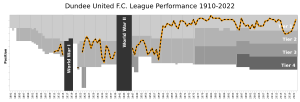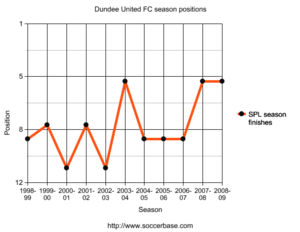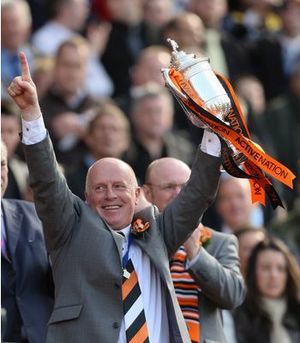History of Dundee United F.C. facts for kids
Dundee United F.C. is a Scottish football club from the city of Dundee. It was started on May 24, 1909, and was first called Dundee Hibernian. The club joined the Scottish Football League (SFL) in 1910.
In 1923, the club changed its name to Dundee United. They were promoted to the top league in Scotland for the first time in 1925. For many years, the team mostly played in the second division.
The club became much more famous under two long-serving managers. These were Jerry Kerr (from 1959 to 1971) and Jim McLean (from 1971 to 1993). Kerr helped United stay in the top league. He also led them into European competitions for the first time.
During the time Jim McLean was manager, Dundee United won their first major trophies. They won the Scottish League Cup in 1979 and 1980. They also won the Scottish Premier Division title in 1983.
The club also did very well in European tournaments. They reached the semi-finals of the European Cup in 1984. They also made it to the final of the UEFA Cup in 1987.
After Jim McLean retired, the club did not reach the same level of success. However, they have continued to compete for trophies in Scotland. They won the Scottish Cup in 1994 and again in 2010.
Contents
Club History
Early Years (1909–1971)
The club was inspired by Hibernian in Edinburgh. In 1909, the Irish community in Dundee started a new football club. This happened after another club, Dundee Harp, stopped playing.
The new club was first called Dundee Hibernian. They took over a football ground called Clepington Park. This ground was later renamed Tannadice Park. Their very first game was on August 18, 1909, against Hibernian. The match ended in a 1–1 draw.
The next year, the club joined the Scottish Football League. In October 1923, a group of Dundee businessmen saved the club from closing. They decided to change the club's name to Dundee United. This was to attract more fans, not just from the Irish Catholic community. The name Dundee City was thought of, but Dundee F.C., the city's other team, did not like it.
United won promotion to the First Division for the first time in 1924–25. They won the Second Division title that season. However, they were sent back down to the lower league within two seasons.
During World War II, the club was supported by its secretary, Arthur Cram.
For many years, the club struggled in the Scottish league. They only played in the top division for four seasons. This changed when Jerry Kerr became manager in 1959. In his first season, Kerr helped the club return to the First Division. They finished second in the Second Division, ending a 28-year wait.
Some important players from this time included Dennis Gillespie and Jim Irvine. Defenders like Doug Smith and Ron Yeats also played. Yeats later became captain of Liverpool in the 1960s.
In the next season, United finished in the top half of the league. They stayed there for most of the next 35 years. In the 1960s, the team became stronger with players from Scandinavia. These included Örjan Persson, Finn Seemann, Lennart Wing, Finn Døssing, and Mogens Berg.
These new players helped United play in European competitions for the first time. On August 25, 1966, Dundee United beat Barcelona. Barcelona was the champion of the Inter-Cities Fairs Cup (now the UEFA Europa League). United won 2–1 in Spain. This was the first time a Scottish club had won a game in Spain.
The Jim McLean Era (1971–1993)
Jim McLean was a coach at city rivals Dundee F.C. He took over from Jerry Kerr in 1971. This started the most successful period in Dundee United's history.
In 1972, Dundee United went on a trip to West Africa. They played against amateur football clubs in Nigeria. The team did not play well. They won only one match and lost two. They also drew two games. The local fans were disappointed with their performance.
Before McLean, United was seen as the smaller club in Dundee. But McLean, sometimes with assistant manager Walter Smith, changed this. He led United to their first ever Scottish Cup final in 1973–74.
The team reached a record high of third place in the Scottish Premier Division. This happened in 1977–78 and again in 1978–79. McLean then guided the team to win major trophies. They won the Scottish League Cup in 1979–80. They won it again the next season. McLean's focus on young players was very important for the club's success.
Dundee United won the Scottish Premier Division title for the first time in their history. This was in the 1982–83 season. They set new records for points and goals scored. By then, United was known in Europe for beating strong teams. These included AS Monaco, Borussia Mönchengladbach, PSV Eindhoven, Anderlecht, and Werder Bremen.
In the European Cup, United reached the semi-finals in their first try. They were just barely beaten by AS Roma. United won the first game 2–0 at home. But they lost 3–0 away. There were later issues with the Italian side, which led to them being fined. In 1986, UEFA suspended the Italian team for a year. Their president was also banned for four years because of these issues.
Dundee United's biggest achievement in Europe came later in 1986–87. United became the first Scottish club to reach the final of the UEFA Cup. On their way, United again beat Barcelona, just like in 1966. This time, Barcelona was managed by Terry Venables. Their team included British players like Gary Lineker, Mark Hughes, and Steve Archibald.
United beat Barcelona both at home and away. They are still the only British team to have done this in any European competition. They have a record of four wins from four games against Barcelona. United did not win the two-legged final against IFK Gothenburg. But they still received a special award from FIFA. It was the first-ever Fair Play Award for the club. This was given for the good sportsmanship of their fans at Tannadice Park.
During these years, Dundee United and Aberdeen broke the usual dominance of the Old Firm in Scottish football. The two clubs became known as the New Firm. Sometimes, Hearts was also included, and they were called the Small Firm. Because Dundee F.C. was not always in the top league, the New Firm derby became more important than the Dundee derby.
Dundee United had come a long way under McLean. They went from being a less known club to one of Scotland's best. In June 1993, after almost 22 years as manager, McLean stepped down. He stayed on as the club chairman, a role he had held since 1989.
After McLean (1993 onwards)
The first non-British and non-Irish manager of a Scottish club took over from McLean. This was Ivan Golac. He took charge of a team with many talented young Scottish players. His first big move was to sell Duncan Ferguson to Rangers. The fee was £4 million, which was a record for a transfer between two British clubs.
In Golac's first season, he brought the Scottish Cup to Tannadice Park for the first time in 1994. The club had lost six previous finals. This win meant the club had now won all the main domestic trophies. United beat Rangers 1–0 in the final. Craig Brewster scored the winning goal.
After this success, the club's fortunes changed. In the 1994–95 season, they had an average campaign. But a series of late defeats, including a 1–0 loss at home to Celtic on the last day, led to them being relegated. They went down to the First Division.
Even though they were expected to win the lower league, they finished second. This meant they had to play a two-legged play-off against Partick Thistle. The winner would play in the Premier Division in the 1996–97 season. Dundee United won 3–2 over the two games. Owen Coyle scored the winning goal in extra time.
Back in the top league, they finished third under manager Tommy McLean. Tommy was Jim McLean's younger brother. But their form did not stay as good, and Tommy left the club 18 months later. Under other managers like Paul Sturrock, Alex Smith, and Paul Hegarty, the club often had to fight to avoid relegation from the Scottish Premier League.
Eddie Thompson bought the club in 2002. He brought in Ian McCall as manager. This led to their first top-half finish in seven years in 2004. But their performance dropped again the next year. McCall was fired, and two more managers, Gordon Chisholm and former player Craig Brewster, also had difficult times.
In 1997–98, United reached the League Cup final. But they lost 3–0 to Celtic. United reached their first Scottish Cup final in eleven years in 2004–05. They were beaten by Celtic again, 1–0.
Since the SPL started in 1998, United have only finished in the top half twice. These were in 2003–04 and 2007–08. They finished ninth for three seasons in a row, from 2005 to 2007. However, when long-time supporter Eddie Thompson bought the club in 2002, he invested a lot in players and managers.
The 2007–08 season saw United narrowly lose the League Cup final on penalties. This was under manager Craig Levein. They also missed out on a UEFA Cup place in the last two games of the season. In October 2008, Thompson sadly passed away from prostate cancer.
Craig Levein became manager in 2006. He started to rebuild the club and improve its youth system. The club easily avoided relegation in Levein's first season. Then they finished fifth two seasons in a row. This was the first time they had two successive top-half finishes since Jim McLean's time. By late 2009, the club was in second place in the league. They even seemed to have a small chance of winning the title.
Levein's good work was noticed. In November 2009, he accepted the job as manager of the Scotland national team. The club replaced Levein with his assistant, Peter Houston. The season ended with a third-place finish for United. They also won their second Scottish Cup.
The next season, they finished fourth. The season after that was similar. They had a poor start but then played well. Young stars like Gary Mackay-Steven and Johnny Russell helped United reach another top-six finish. This was their fifth top-six finish in a row. The club qualified for the UEFA Europa League for three seasons in a row. However, they were knocked out early in each campaign.
On January 17, 2013, it was announced that manager Peter Houston would leave Dundee United in May 2013. But on January 28, it was announced that Houston had left the club earlier. He was replaced two days later by Jackie McNamara. McNamara's first game in charge was a Scottish Cup match against Rangers. United won 3–0. McNamara started to improve the club's results. They secured a top-six place over rivals Aberdeen in a dramatic way.
In his first full season, McNamara led United to fourth place in the Premiership. They also reached the 2014 Scottish Cup Final. They lost 2–0 to St Johnstone at Parkhead.
The next season, United started their league campaign strongly. They won six of their first eight games. This included big away wins against rivals Aberdeen and Dundee. At one point, United were even seen as a surprise contender for the league title.
However, a disappointing run of results followed, especially after February. This was because two key players, Stuart Armstrong and Gary Mackay-Steven, were sold to Celtic during the season. United's league form collapsed, and they finished a distant fifth. United's remaining chances for success ended in one week in March. They were beaten by Celtic in the 2015 Scottish League Cup Final at Hampden Park. Then they were knocked out of the 2014–15 Scottish Cup by the same team after a replay.
McNamara was fired and replaced by Mixu Paatelainen in October 2015. But the team's form did not get better. United were relegated to the Championship after a 2–1 defeat against Dundee on May 2, 2016.
They tried to return to the top division right away but were not successful. They finished third in the 2016–17 Scottish Championship. This meant they played in play-off matches. They beat Morton and Falkirk. But they lost the final round against Hamilton. In 2017–18, United finished third again. They beat Dunfermline in the first play-off round. But they lost to Livingston in the next round.
United finally won promotion to the Premiership in 2020. They won the Championship under manager Robbie Neilson. Neilson was replaced by Micky Mellon, who was then replaced after one season by the current manager, Thomas Courts.
See also
- Arthur Cram, a club administrator during World War Two
 | John T. Biggers |
 | Thomas Blackshear |
 | Mark Bradford |
 | Beverly Buchanan |




